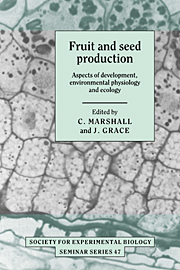Book contents
- Frontmatter
- Contents
- Contributors
- Preface
- Plant reproductive biology: an overview
- The environmental control of reproductive development
- Pollination and fertilization in higher plants
- Embryogenesis
- Environmental and internal regulation of fruiting, with particular reference to Cox's Orange Pippin apple
- Fruit growth and sink strength
- Control of grain growth and development
- The regulation of maternal investment in plants
- Ecological and physiological aspects of reproductive allocation
- Are the distributions of species determined by failure to set seed?
- Edible fruits in a cool climate: the evolution and ecology of endozoochory in the European flora
- Index
The regulation of maternal investment in plants
Published online by Cambridge University Press: 04 August 2010
- Frontmatter
- Contents
- Contributors
- Preface
- Plant reproductive biology: an overview
- The environmental control of reproductive development
- Pollination and fertilization in higher plants
- Embryogenesis
- Environmental and internal regulation of fruiting, with particular reference to Cox's Orange Pippin apple
- Fruit growth and sink strength
- Control of grain growth and development
- The regulation of maternal investment in plants
- Ecological and physiological aspects of reproductive allocation
- Are the distributions of species determined by failure to set seed?
- Edible fruits in a cool climate: the evolution and ecology of endozoochory in the European flora
- Index
Summary
Introduction
The effects of the environment on the number and quality of the offspring produced by organisms is the fundamental concern of evolutionary ecology. For plants, the number and quality of their offspring may be limited by external environmental factors, such as pollination and seed predation, or internally by the availability of resources which, in turn, may be influenced by weather and soil conditions, herbivory, disease and competition. Each of these factors may vary over time and location. In response to these varying environmental conditions, plants may adjust their resource commitment to seed production by altering (i) the number (or gender) of flowers that differentiate, (ii) the number of ovules per flower, (iii) the number of fruits and seeds that abort, and (iv) the mass of the mature seeds (see, for example, Adams, 1967; Primack, 1978; Lloyd, 1980; Stephenson, 1981, 1984; Thomson, 1989). In the parlance of our colleagues who study animals, plants can potentially alter (i) clutch size (a clutch is defined as offspring in more or less the same developmental phase that are simultaneously drawing resources from the maternal plant), (ii) the interval between successive clutches, and/or (iii) the mass of the offspring at the termination of maternal care (Stearns, 1976; Burley, 1980).
The goals of this Chapter are to review the individual mechanisms by which plants regulate maternal investment under various environmental conditions, to review the directions in which these mechanisms are regulated with respect to one another, and to review the consequences of the different mechanisms of regulation on offspring performance (quality).
- Type
- Chapter
- Information
- Fruit and Seed ProductionAspects of Development, Environmental Physiology and Ecology, pp. 151 - 172Publisher: Cambridge University PressPrint publication year: 1992
- 42
- Cited by

